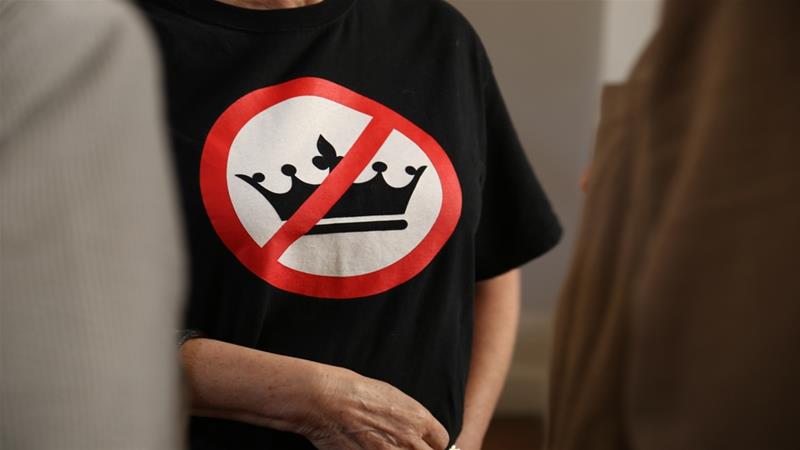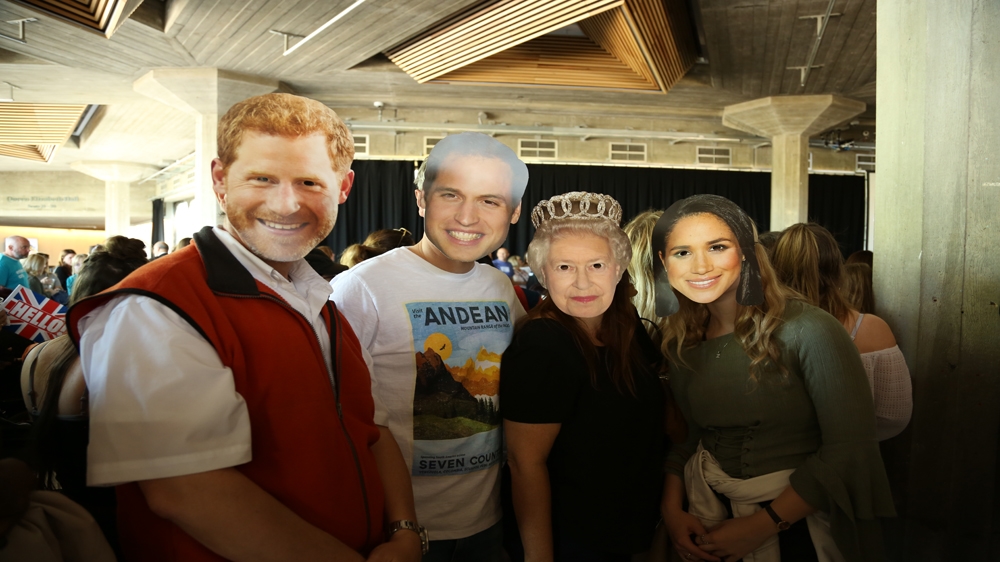The anti-royal wedding party: Republicans dream of monarchy's end
Republicans from across Europe meet in London to call for an end to monarchy amid royal wedding celebrations in the UK.
London, UK – Republican sentiment has seemed as welcome as an unruly wedding guest in Britain in recent weeks.
Still, away from the pomp and ceremony laid on for the wedding of Prince Harry and Meghan Markle, a group of anti-monarchists gathered to mark the occasion in their own way.
Around 130 people attended the International Republican Convention on Saturday, the culmination of a four-day meeting of the Alliance of European Republican Movements in the centre of the UK’s capital, London.
Representatives of republican groups in Spain, the Netherlands, Denmark, Sweden and the United Kingdom addressed the audience. And while the turnout was small compared with pro-royal celebrations elsewhere, the strength of feeling on display was no less impassioned.
The monarchy “carries on an elitism that is so unfair”, said Irene Pinner, who had travelled from Dorking, just outside London, to attend the convention.
“They [the royal family] don’t represent me.”
David Hurst, a former British soldier who once swore an oath of allegiance to the Queen, added of the royal system: “It’s just so outdated … people in this country look on the Queen as a higher being.”
According to Republic, the group that hosted the convention and has long campaigned for an elected head of state in the UK, the convention sought to showcase the arguments for getting rid of the monarchy.
“We need to look past the fluff of the wedding and focus on the serious issues,” Republic chief executive, Graham Smith, told Al Jazeera.
“The monarchy is unprincipled and undemocratic … now is the time for reform.”
Republic of Britain?
Mustering widespread support for the republican cause remains an uphill task, however.
Britain operates under a system of parliamentary democracy and constitutional monarchy. While its politicians are elected, Queen Elizabeth II is its hereditary head of state.
Support for an end to this system has barely risen above 20 percent at any time over the past 30 years, according to research by polling firm Ipsos Mori, while a survey commissioned by Republic and undertaken by YouGov earlier this week found that 60 percent of the British population liked the Queen.
Separate YouGov data, meanwhile, shows that support for the royal family remains strong across every age demographic.
Proponents of Britain’s monarchy say the royal family provides continuity, tradition and a neutral head of state that is above the fray of party politics.
According to Alexander Shayler, senior spokesperson for the British Monarchist Society and Foundation, the royal family also brings a net financial benefit to the UK in terms of attracting tourists, trade and inward investment.
A report by UK business valuation consultancy, Brand Finance, estimated the monarchy generated $1.76bn for the country’s economy in 2017.
Republicans, however, question the veracity of these figures and highlight the cost to taxpayers of providing security and travel to members of the royal family, as well as for the refurbishment of properties such as Buckingham Palace.
Tommy Sheppard, a Scottish National Party member of parliament and long-time republican, said that even if Britain moved to a model where a head of state was elected, the royal family could “still play a role in public life”.
While wishing the newly married royal couple happiness together, Sheppard said the “argument for people to be able to elect a head of state is really an unanswerable one”, whatever the truth about the financial costs or benefits.
Court of public opinion
But even though there was a captive audience for these kind of arguments at Saturday’s convention, convincing the wider British public of their merits still appears a long way off.
At a royal wedding party at the Southbank Centre across town, hundreds gathered to watch the wedding on a big screen, waving mini Union Jack flags as the royal couple completed their vows.
Maria Yoneda travelled from Newcastle, a city in the north of England, to take part in the occasion with her boyfriend, James. “I think it brings people together,” Yoneda said, shortly before raising a glass to the newly married couple. “People like it, get together, party – it’s nice.”
Nearby, Dan Fries was wearing a Prince William face mask.
The royal family is “part of the UK and part of being British”, he said. “I’m proud of the royals.”
Republic chief executive, Smith, remains unperturbed. He vows to campaign “relentlessly” to bring an end to the monarchical system.
Smith is buoyed by Republic’s recent YouGov survey finding that while the vast majority of respondents are content with the Queen, her son and next in line for the throne, Prince Charles, is far less popular.
He also points to data showing that although 60 percent said they liked the Queen, only a third said they liked her a great deal, while 66 percent said they were not bothered about the royal wedding.
“Support for the monarchy is high but shallow,” he argued. “Most people are happy to carry on with the status quo, they don’t care that much,” added Smith.
“It’s all to play for if those people can be persuaded.”
Until that happens, however, Britain’s monarchy doesn’t appear to be going anywhere.
Source: Read Full Article






